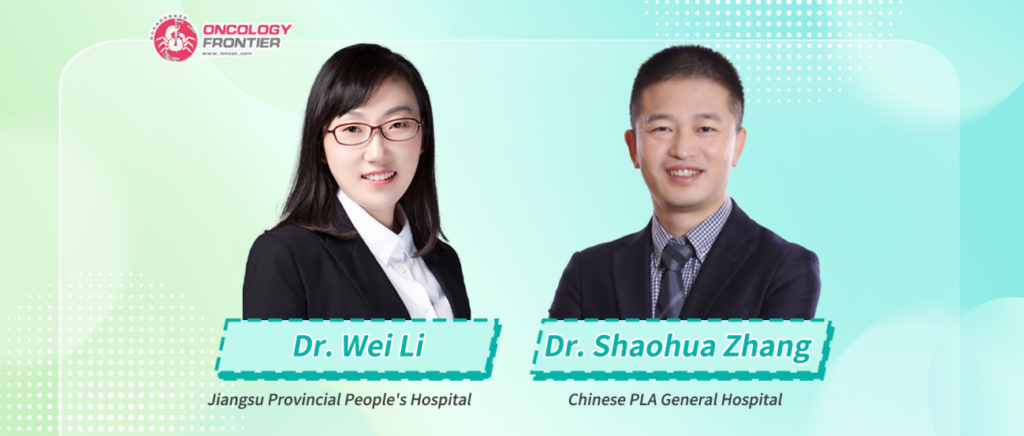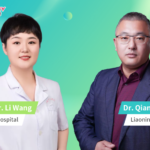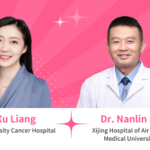
Editor's Note: For patients with recurrent metastatic triple-negative breast cancer (TNBC), would you choose "chemotherapy + immunotherapy" or "ADC" for treatment? At the 2024 Breast Cancer Summer Forum·Northern Salon "In-Depth Analysis" session, Dr. Wei Li from Jiangsu Provincial People's Hospital and Dr. Shaohua Zhang from the Chinese PLA General Hospital presented their respective viewpoints. Dr. Wei Li expressed a preference for "chemotherapy + immunotherapy," while Dr. Shaohua Zhang opted for "ADC." Following the session, Oncology Frontier invited the two experts to elaborate on their perspectives.Presenting Views and Analyzing Reasons
Dr. Wei Li: Choosing “Chemotherapy + Immunotherapy” for Treatment
In the treatment of advanced TNBC patients, “chemotherapy + immunotherapy” is supported by numerous phase III clinical study data, such as the KEYNOTE-355[1] and TORCHLIGHT[2] studies, providing comprehensive data. This regimen is also recommended as a first-line treatment in various guidelines and consensus, so I would choose “chemotherapy + immunotherapy.” Furthermore, immunotherapy has a tail effect, and I believe that patients who benefit from “chemotherapy + immunotherapy” can achieve better OS outcomes. Regarding adverse reactions, immunotherapy has better safety compared to ADC drugs. ADC drugs can cause adverse reactions such as diarrhea, neutropenia, or interstitial pneumonia. However, in clinical practice, we see that immunotherapy mainly results in manageable adverse reactions like hypothyroidism, which occur relatively infrequently. Therefore, I believe the safety of immunotherapy combined with chemotherapy is superior to that of ADC drugs combined with chemotherapy. Future data on ADC combined with immunotherapy will be newer and better, but overall, ADC drugs are essentially “disguised” chemotherapy drugs, with immunotherapy effects being prominent. When combining immunotherapy with ADC drugs, it is still broadly a concept of immunotherapy combined with chemotherapy, with immunotherapy playing a crucial role in clinical benefits. From the perspectives of drug accessibility and pharmacoeconomics, immunotherapy drugs are more accessible, especially with domestic immunotherapy drugs (such as toripalimab) entering the clinical setting, significantly reducing treatment costs for patients. With better accessibility and patient compliance, I believe chemotherapy combined with immunotherapy is a very important choice in the treatment of advanced TNBC patients.
Dr. Shaohua Zhang: Choosing “ADC” for Treatment
ADC drugs have unique structures and mechanisms of action, making them one of the most popular drug classes in recent years. In TNBC, the current hottest target is Trop-2. The ASCENT study[3] results showed that for patients with advanced TNBC without brain metastases who had received a median of four prior chemotherapy lines, the Trop-2 ADC drug sacituzumab govitecan (SG) significantly extended median PFS (5.6 months vs. 1.7 months, hazard ratio: 0.39, P<0.0001) and OS (12.1 months vs. 6.7 months, hazard ratio: 0.48, P<0.0001), reducing the risk of disease progression or death by 61% and overall mortality by 52%. Based on this, SG became the first ADC drug approved for treating advanced TNBC, indicated for adult patients with unresectable locally advanced or metastatic TNBC who have received at least two prior systemic therapies, including at least one for metastatic disease. Currently, the survival benefits brought by most Trop-2 ADC drugs are concentrated in second-line and later treatments for TNBC. Besides SG, Trop-2 ADC drugs SKB264 and Dato-DXd have also shown efficacy benefits in treating TNBC. Additionally, some TNBC patients may have low HER2 expression. For ER-/HER2 low-expressing advanced breast cancer, the DB-04 study[4] indicated that the HER2 ADC drug DS-8201 also showed good therapeutic efficacy. Although immunotherapy has strong data support in treating advanced TNBC, the effectiveness of monotherapy immunotherapy in second-line and later treatments is not satisfactory. While immunotherapy combined with chemotherapy has certain advantages, it has not been approved for second-line and later treatments. Therefore, in terms of absolute benefits, immunotherapy’s efficacy in second-line and later treatments is inferior to ADC drugs. We must also pay attention to the safety of patient treatments. Although ADC drugs can cause adverse reactions like diarrhea, these are generally preventable and controllable. In contrast, immunotherapy’s adverse reactions are like time bombs, which can be life-threatening when severe. Moreover, the approved indications for immunotherapy come with companion diagnostics, such as CPS≥10, CPS≥1, etc., which do not cover the entire TNBC patient population, highlighting a shortcoming of immunotherapy.
Pursuing Truth Through Debate, Striving for New Journeys
Dr. Shaohua Zhang: Today’s thematic debate is not about one side overpowering the other. I believe future first-line treatments for TNBC will likely explore ADC combined with immunotherapy. Therefore, I think the future direction will be “integrating the best of both worlds,” with immunotherapy combined with ADC drugs being one of the development directions.
Dr. Wei Li: In first-line patient treatment, even without testing for PD-L1 expression, combining immunotherapy with ADC drugs can achieve very good efficacy. This suggests that combining immunotherapy with ADC drugs could potentially expand to the overall patient population. We look forward to better and more comprehensive treatment data for immunotherapy combined with ADC drugs in the future.
Vote
For recurrent metastatic TNBC, would you choose “chemotherapy + immunotherapy” or “ADC” for treatment? (Single choice)
- “Chemotherapy + immunotherapy”
- “ADC”
- Abstain
Dr. Wei Li
Department of Oncology, Jiangsu Provincial People’s Hospital PhD, Chief Physician, Associate Professor, Master’s Supervisor Member of the Breast Cancer Expert Committee of the Chinese Society of Clinical Oncology (CSCO) Standing Committee Member of the Youth Expert Committee of CSCO Member of the Breast Cancer Professional Committee of the China Anti-Cancer Association Member of the Tumor Targeted Therapy Professional Committee of the China Anti-Cancer Association Deputy Director of the Yangtze River Academic Belt Breast Cancer Alliance (YBCSG) Standing Committee Member of the Molecular Targeted Therapy Professional Committee of the Jiangsu Provincial Research Hospital Member of the Cancer Rehabilitation and Palliative Treatment Professional Committee of the Jiangsu Anti-Cancer Association Youth Talent of Jiangsu Provincial “Science and Education Strong Health Project” Visiting Scholar at the University of South Carolina School of Medicine, USA
Dr. Shaohua Zhang
The Fifth Medical Center of the Chinese PLA General Hospital, PhD, Associate Professor, Master’s Supervisor Deputy Director of the Department of Oncology, Fifth Medical Center of the General Hospital of the PLA Director of the Breast Cancer Expert Committee of CSCO Executive Committee Member and Deputy Secretary-General of the Breast Cancer Expert Committee of CSCO Editor-in-Chief of the Breast Disease Channel, Medical Reference News Deputy Director of the Breast Cancer Integrated Prevention and Screening Committee of the China Anti-Cancer Association


